An interview with Skateboard School Amsterdam: a positive path to Skateboarding
"At Skateboard School Amsterdam we are not making skateboarding more positive, because it already is! We just try to create an environment with the focus on all those positive aspects of skateboarding." – Menno Becht, founder of Skateboard School Amsterdam
Getting into skateboarding can be hard sometimes. I imagine many of those who start it, especially young kids, have struggled to fit in with others at the skatepark. A beginner may feel like an outsider or even ashamed of their difference in skill level. Fortunately, some beginners start skateboarding with their friends, so they always have a skate buddy around. A skater with a support system and friends to motivate them can really push them to improve their skating. And, thankfully, skaters are quite compassionate when it comes to hyping one another. They all know what it's like to fail and fall a hundred times or how mentally frustrating it is to really commit to a trick sometimes.
At Skateboard School Amsterdam, beginners, kids, or people who simply want to get back into skateboarding, have the opportunity to be surrounded by skaters of a similar level. Thanks to their skateboard coaches, they're also given proper advice and motivation from experienced people. Even if you're not a beginner, SSA (Skateboard School Amsterdam) also has higher levels where skaters can improve their personal development by learning to be consistent with all their basic tricks. After being founded in 2017, SSA is still providing a positive environment for skaters of all ages, where they can receive proper advice and improve their set of skills. I wanted to know more about SSA because they were providing something new to many beginner skaters: a skateboarding environment with experienced mentors dedicated to improving a skater's individual skills on a communal level; sort of like any other skatepark but with more structure. For example, it's really common for beginners to ask and receive good tips from other skaters, so why not organize that on a wider scale, where skaters can trust the advice they're given? I had a call with Menno Becht, the founder of SSA, who also ran Lockwood Skate Camp in Antwerp with Vincent Vos from 2012 to 2015. Back in 2003, he was giving weekly skateboarding classes to more than 100 kids at a go-kart track in Nijmegen with several other teammates. Menno was teaching people how to skate before some of us even picked up a board, so I'm sure he knows a thing or two about making a school for skateboarding.
Combining pedagogy with skateboarding — a talk with Menno Becht
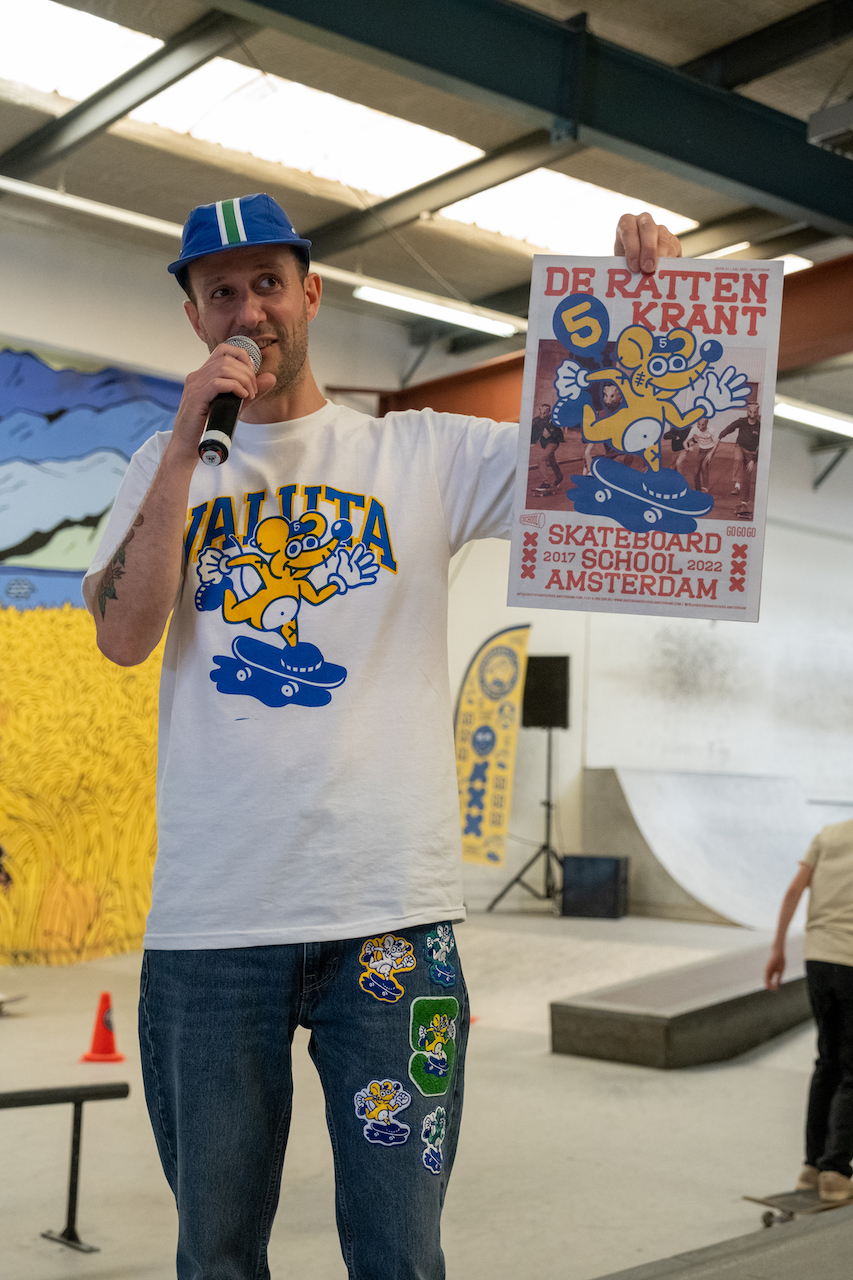
Lea: When and why did you decide to start "Skateboard School Amsterdam"? Where did the idea come from?
Menno: Like skateboarding, somehow teaching was a part of my life from a young age. I started assisting my gymnastics teacher when I was 13 years old. Then, when I was 16, some friends of my mother started asking if I could teach skateboarding to their kids. So I did. Then at my 18th (year 2003), I skated for 24/7 Skate Shop in Nijmegen and they started to give skateboard classes at a go-kart track. So every Saturday morning we were teaching around 150 kids there. At that time it was pretty crazy how well that went. Later on, I started my studies on Pedagogics and had the wish to start my own after-school daycare centre which I would like to combine with skateboarding. During my studies, Vincent Vos asked me to join him in running the Lockwood Skate Camp in Antwerp.
L: How long did you run Lockwood Skatecamp? Or are you still running it?
M: I joined Lockwood Skatecamp as a coach in 2012 and ran it from 2013 till 2015. This was an amazing time. We did 3 weeks of camps with 50 kids per week, every year. I learned so much from this and it really gave me a push in developing the skills needed to run a business. When I finished my studies I took the big step. I registered my company Parallel Projects. The idea was to organize all kinds of skateboard-related lessons, camps, events and activities in which the goal was to always put a layer of personal development on top of the physical activity of skateboarding. Then just a month after I registered my company Michael Groenewegen asked me to organize the skateboard lessons at the new indoor skatepark in Amsterdam (Skatepark NOORD) he was working on. So Skateboard School Amsterdam was born. The rest is history.
L: I must imagine that it felt like a big accomplishment to finally create something you were thinking about for a long time. What have you learned since founding the Skateboard School?
M: A lot! One specific personal thing is that it helped me live my life more in line with my actual wishes. When working with kids and parents on the scale we do, you have to be 100% on point. You can't slack. So, in a way, it forced me to take good care of myself so that I'm able to take good care of my team, all the partners and all the people joining our classes.
L: Skateboard School Amsterdam's vision is to make skateboarding more positive, what does that mean to you?
M: Well, skateboarding has not always been accepted as it is nowadays. While, in fact, skateboarding had such a positive influence on many of us. We learned so much just because we were part of the amazingly rich culture of skateboarding. Of course, our culture has downsides too, like many of us have challenges with abusive alcohol or drug use. It’s not about judging that, but it is probably a good idea to be aware of it. You can't be strong if you don’t know your weaknesses. At Skateboard School Amsterdam we are not making skateboarding more positive, because it already is! We just try to create an environment with a focus on all those positive aspects of skateboarding. Physically, we skate which is quite healthy to do. And, by being aware and making others aware of all the qualities one develops while skateboarding, we put the layer of personal development on top of the physical activity. When you start to focus on positive things you can help others while helping yourself. So it’s good for everyone. It’s full circle you know.
L: Totally. I feel it's also important for the younger generation to have a safe space when being introduced to skateboarding. Many tend to look over the bad influences it can have on young ones. But, Skate School offers classes to both young and old age groups, would you say Skate School acts like a safe space for those who want to learn it?
M: It went naturally with the Skate School. Everybody had an open attitude to teaching and learning skateboarding. Our coaches all had an openness to teaching which allowed them to focus on the positive aspects. The beginners also had the openness to learn for themselves. But, we were also taking risks in the beginning by teaching at different levels and making 12+, 18+ and 30+ age groups. We didn't know if it would work, but people kept coming. They enjoyed skating with other people at the same level and in their age group. It can be considered a safe space in the way that we are trying to work with everyone on a professional level while still being skate rats ourselves.
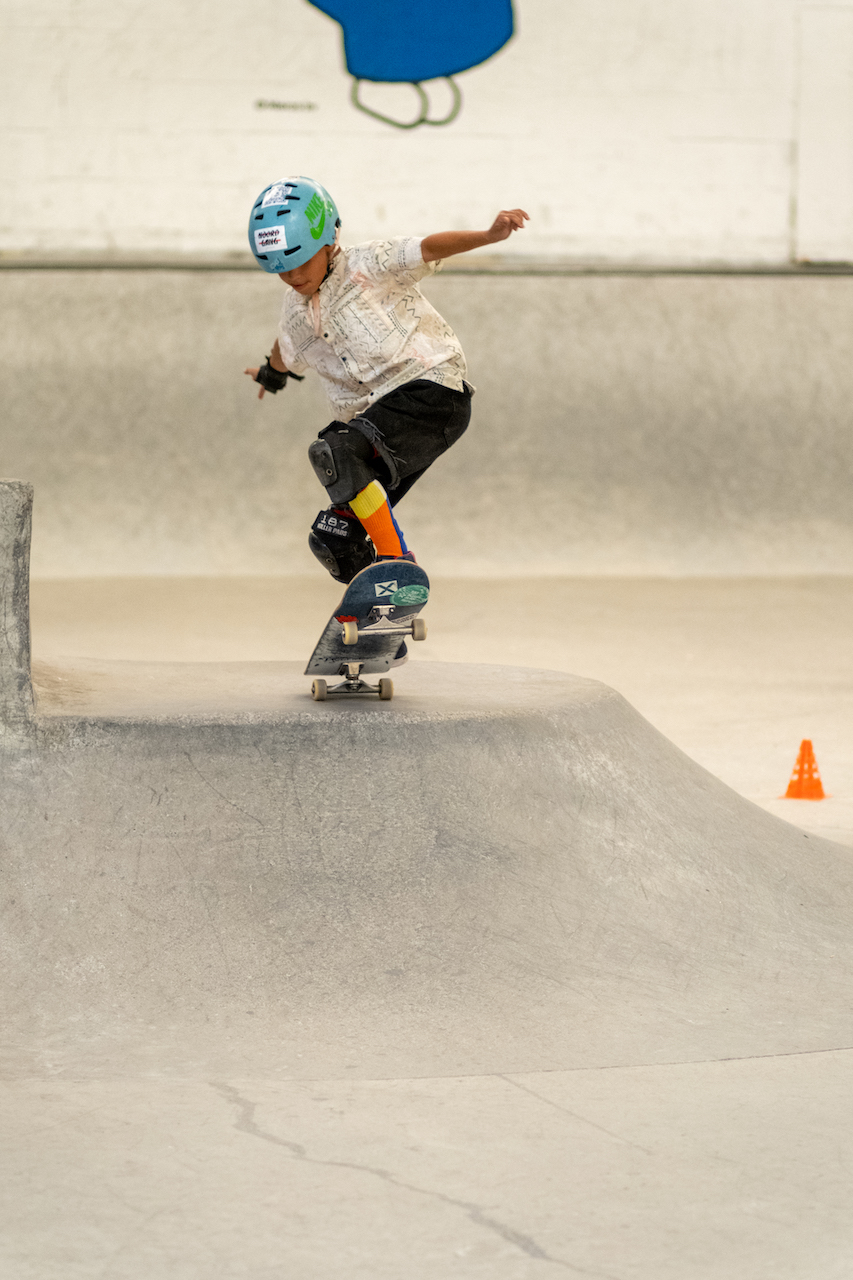
L: In today's skateboarding community, there's a debate on whether it's more of a sport or a cultural activity. Since Skateboard School teaches skateboarding similarly to other sports lessons, how does it maintain the cultural values of skateboarding?
M: I'm not so much of a debater myself, I'm more someone who jumps in and tries to make the best of the situation. Situations change all the time. I think the sports approach of skateboarding is just another path next to the other paths in skateboarding. And, just like most things, it has positive and negative effects. The good thing is that we decide how we work with that. One of the things I personally like about the sports approach is the awareness and focus on a healthy lifestyle. I also like that everywhere in The Netherlands, great concrete skateparks are popping up by companies owned by skateboarders. I think it would be a great idea to keep all paths of skateboarding in the hands of skateboarders and make the best of it. I really hope skateboarders will stay active in doing this. Jumping in and taking responsibility is not always easy but definitely needed. It’s the people who make the culture!
At the end of our phone call, Menno said that the most important thing they were doing at Skateboard School Amsterdam was having fun. He also talked about the competitive stresses that potentially come with being in any other skateboarding environment. As a younger skater, he sometimes would compare himself to others or overthink whether a trick is cool or not. This still happens in today's world of skateboarding and this type of mindset can quickly become a daily norm if you let it. These unwritten rules at a skatepark also give it a certain structure, whether it be socially or as a hierarchy. And one may be seen as "uncool" or an outsider if they don't have a certain style or trick selection. In the midst of the culture/sports debate going around in skateboarding, the skate lessons offer an opportunity for everybody to learn how to skate. Menno explained to me how SSA also makes skateboarding more accessible for those who wouldn't practice the sport otherwise because they reach out a lot. The openness approach at SSA helps push the skaters to develop themselves without necessarily dealing with the stresses of a "schooling" environment,
Learning more about how the SSA works with Jori Hall, Manager and Skate Coach
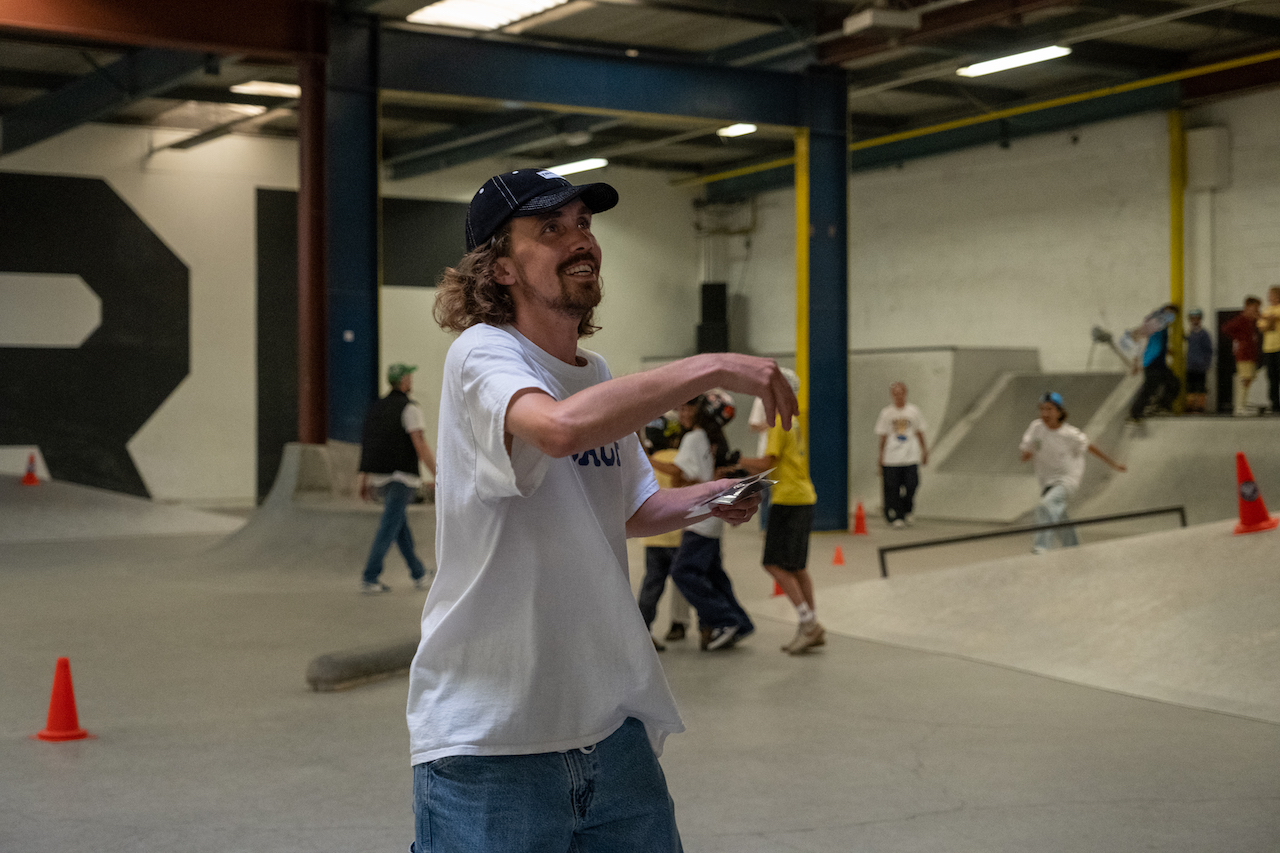
L: Maybe you can first start by telling me how Skateboard School Amsterdam works in general.
Jori: At Skateboard School Amsterdam, we work with the skateboard passport. It's literally like a passport with different skate tricks in it, which are divided by levels. Level 1 is for complete beginners where we learn how to push, kick turn, and drop in… With Level 3 you start to do more tricks like ollies and rock to fakies. Level 4 has shuvits, level 5 kickflips…
L: So it's really gradual?
J: Yeah! It starts slow, with 13 tricks for the lowest level, but then level 6 has 50 tricks you need to be able to do, and that's how we choose what to do in the lessons, we work with the skateboard passport. So it's like a red line through our lessons. And that's why you hear all the kids constantly say "Ah I'm in level 5 or level 4"
L: Oh alright, so they're always discussing their difference in levels, that's funny.
J: Exactly, and of course, if you go into level 6, then you've got kids that have been in that [really high] level for a long time and other kids that just got into level 6. There is some level difference in there but it's not too big so you can still teach the entire group something new.
L: Oh, sick, because I was also wondering what a day at the Skate School looks like.
J: For example, today, on a Sunday, the first lesson starts at 9 and the last one ends at 1. We usually have notes to write down what tricks we want to do. You can always look back on what we did last week and the one before and then we just try to gradually improve their tricks and make sure they can do all the tricks in the passport.
L: You check on previous tricks to gauge their levels?
J: Yeah, so kids get stamps in their passports once they can land a certain trick, which helps to see the possibilities for the kid as well. And you can constantly work on the tricks that they can't do yet. If it's not consistent we do it again. And of course, there's always space for fun tricks and other stuff you want to do. We work with the passport, which is the main line, but of course, there is always space for other stuff.
L: And, in that passport, is there every possible trick you can do or is it just the basics?
J: It's the basics, yeah. I always say "You come to skateboard lessons for an hour, and in that hour, we teach you the basics, the basics of every trick at your level, and then outside of the lessons you can try and improve those tricks and combine them with new tricks too."
L: Ah, okay, yeah, that makes sense honestly; they still have the opportunity to build themselves up regardless. But I was thinking, now that there's money and parents involved with the kids at Skate School, do you ever get parents who maybe pressure the coaches to make their kids better?
J: What I've noticed is, especially now that skateboarding has become an Olympic sport, at the skateboarding lessons, we have what I always call "football parents", like the parents that are on the sidelines yelling at their kids. We get more of those now but not that much. We do get more kids whose parents ask them to do one sport, so they decide to take skateboarding. This year they're skateboarding, the other year, they're hockeying… it's normal. They come in and after half a year or so they go out again, but the core stays. The kids that really like skateboarding stay.
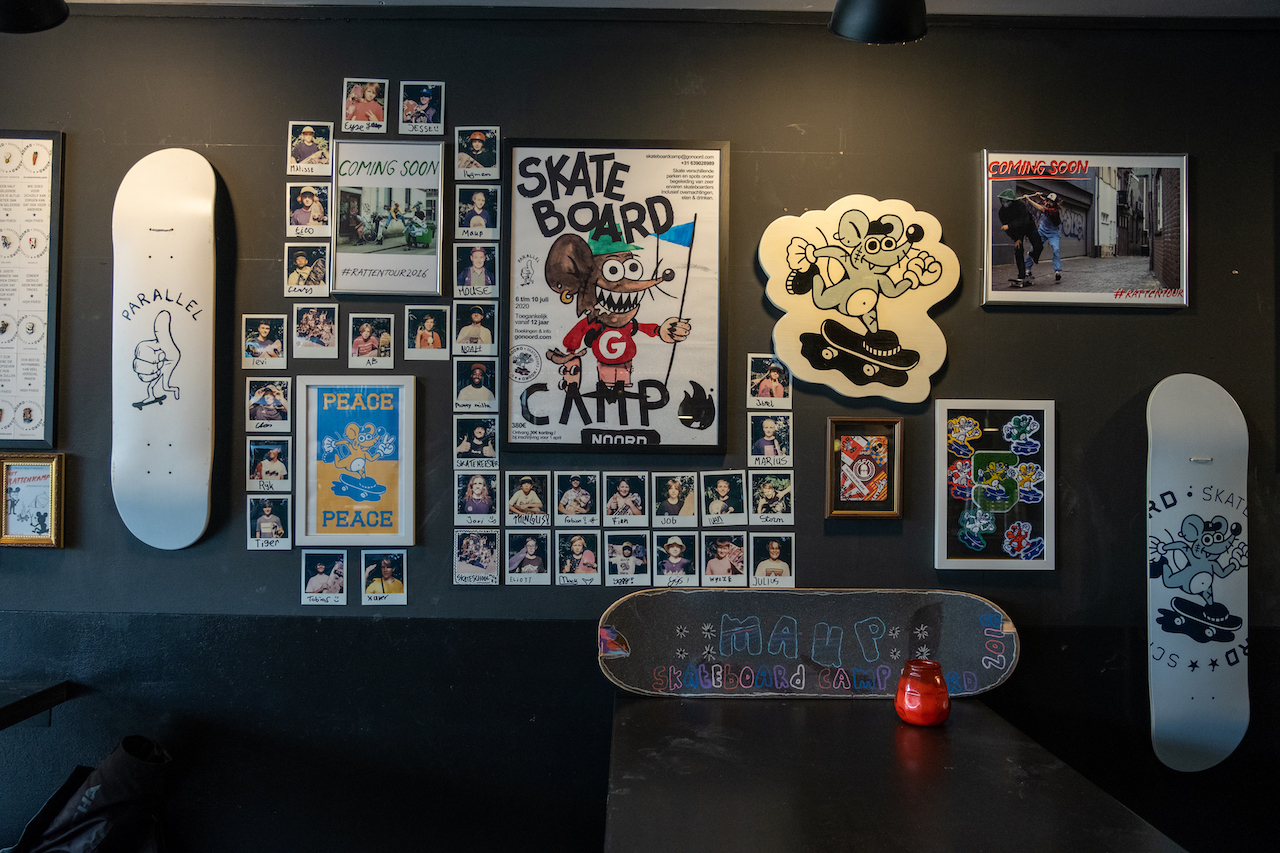
L: I also wanted to talk about skateboarding and the cultural experience at the Skate School. How do you feel about people calling skateboarding a culture and not a sport, as a Skateboard coach?
J: Skateboarding is a culture, but because it's now also officially an Olympic sport as well, there is also a big sports aspect to it. What I think Menno is trying to do with the skate school is synchronize the sport and the culture together to make one big movement. That's what he's trying to do and in my eyes, it looks like it's working pretty well.
L: You're also providing the resources with your facilities, like the classes and the coaches. I asked one kid why he chose to be at this skate school and he said it was his only option.
J: For lessons, yeah, and sometimes you hear other skaters say "Eh why would a kid need a lesson?" I do understand because, like me and you, we learn it by just skating in the street or the skatepark. But when you were skating in the skatepark, you would go up to other skaters and say "Hey could you give me a tip?" and we just provide that within a specific line and we look at a kid's level and see what tricks he wants to do and how we can work with that. You have some kids that are like "I can't do an ollie but I want to learn tre flip". And you're just like "Well, that might be a big step so maybe let's start with an ollie first and build from there"
L: So there's more structure but, at least, thanks to that structure you can provide better advice and feedback?
J: Yes exactly.
L: This is somewhat related to what you said about the kid wanting to learn tre flips before ollies. Skateboarders have different styles and don't necessarily go by the book. For example, you have technical skaters, big-impact skaters, or more creative skaters. How do you manage the different types?
J: As I said earlier, we've had a lot of discussions with different instructors in the entirety of Holland as to how the passport influences these kids. We have, for example, one kid who really wants to skate bowl, but level 6 usually has flip tricks, grinds, slides and basic transition tricks, but no specific bowl part. We offer what you learn in the lessons, which are the basics. What you want to learn outside of the lesson, you can try to do that yourself. But once you have the basics, you can improve in any subject. If you wanna skate big stairs, go skate big stairs, but first you need to be able to do a tre-flip on flat before popping it down a 12-stair. That's my opinion but some people are like "Nah, you can just try it on a 12-stair" and I'm like "I don't wanna kill myself".
L: The last thing I want to ask since we were talking about the "culture or sport" debate in skateboarding, is: Do you think the cultural values get lost or are they maintained in the Skate School?
J: I think they are fully maintained, even with helping kids get back into skate culture. There are a lot of different aspects to skateboarding. Some people think it's only a culture, others think it's only a sport. It's one big heap of thousands of people who all do the same thing but everybody uses their own creativity and does it their own way. I don't think we're losing anything in terms of culture, we're maybe just doing it differently. It's the same as a skatepark environment, just more structural.
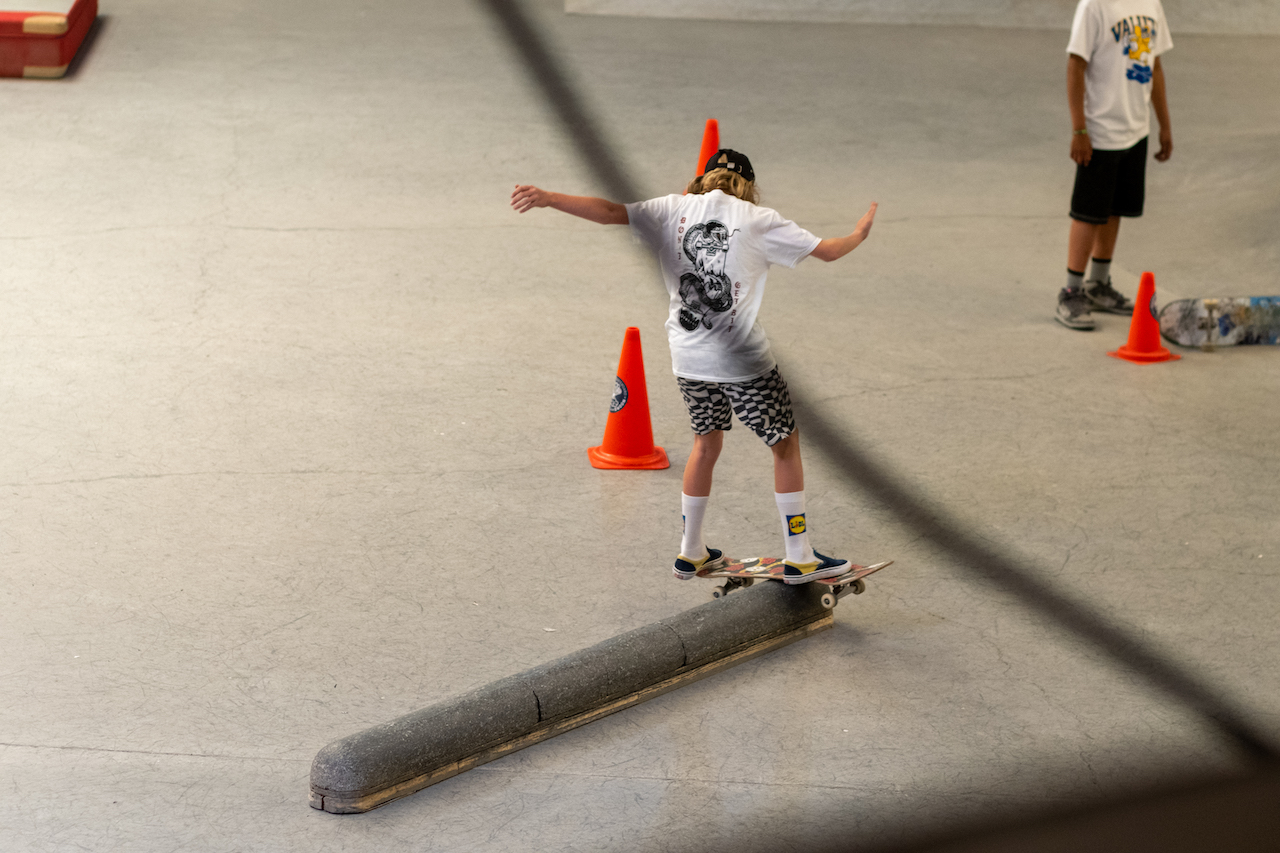
Suddenly, a loud noise goes off near Skatepark Noord, in the midst of the interview. We look outside and it turns out it's just kids from the skate lessons playing with fireworks outside.
L: Holy shit, haha, that's in the voice note!
J: Those are kids from level 6 at the Skateboard school, haha, this is what I mean by culture.
L: Hahaha, exactly, they're just any other kids having fun at the skatepark.
J: Yeah, I hope they don't lose their fingers though.
So far, Jori has given us a great look into what it's like being at SSA. These kids all probably have a special place in their room where they keep their prized Skateboarding Passports. And, honestly, I kind of want one for myself to see where my tricks fit in. Before wrapping this article up, I wanted to mention a couple of things that struck me when speaking with the kids at SSA. One of them told me that he got into it because his friend organized a skate workshop for his birthday. He had never skated before, and since learning the ways of skateboarding that day, he joined SSA and is still enjoying it to this day. Another kid told me that he met many of his current friends there. Some of them were already really good at skating, which inspired him to get better too. He said it motivated and hyped them to keep trying whatever they were trying to do. In the lower levels, several kids said that it doesn't feel competitive and that everyone is quite supportive. But, in the higher levels, like level 6 as Jori mentioned earlier, you've got teenagers with a really high skill level, so there's bound to be some feeling of competition there.
Later on, while attempting to interview a Dutch kid who barely understood a word I was saying, his father resourcefully gave me some nice insight as a skater-parent. He applauded the SSA for having coaches with real experiences in skateboarding and providing young kids with positive guidance. To him, it felt like the "schooling" or "class" aspects of the lessons were overshadowed by the communal feeling they all shared.
Ultimately, the coaches act like mentors who can relate to young kids who are getting themselves into the difficult and detail-oriented activity that is skateboarding. Instead of being told to "just commit", which you hear a lot at the skatepark, kids are given proper advice, like having to change the position of their front foot, straighten their shoulders or anticipate where they have to land on a board. Thanks to the degree of openness and experience in teaching themselves how to skate, coaches can have a big positive impact on kids who will also implement that positive thinking and engage themselves more outside of lessons.
So, does the Skateboard School change the way beginners integrate themselves into skateboarding? Not necessarily. While they're definitely getting more help than a REGULAR skater back in 2008, there's no harm in making a structured learning environment for skating. Especially since beginners can solicit proper advice which will most likely help them develop their skills but also themselves. As Menno Becht mentioned before, it's not only about learning how to skate but also about improving one's personal development. Perhaps for those who started skating in the streets or in their backyards, it seems strange to have such an organized place to skate. But skateboarding is an ever-changing culture, which has always combined creativity and individual growth. A skater can choose to skate however they want, whether it be in the streets or not. At SSA, newbie skaters can improve themselves but also have the freedom to skate artistically outside of their lessons. They can also take what they've learnt from them and develop their own approach to skating. It's simply a learning environment which combines skateboarding and positivity, but the cultural aspects are for them to figure out.
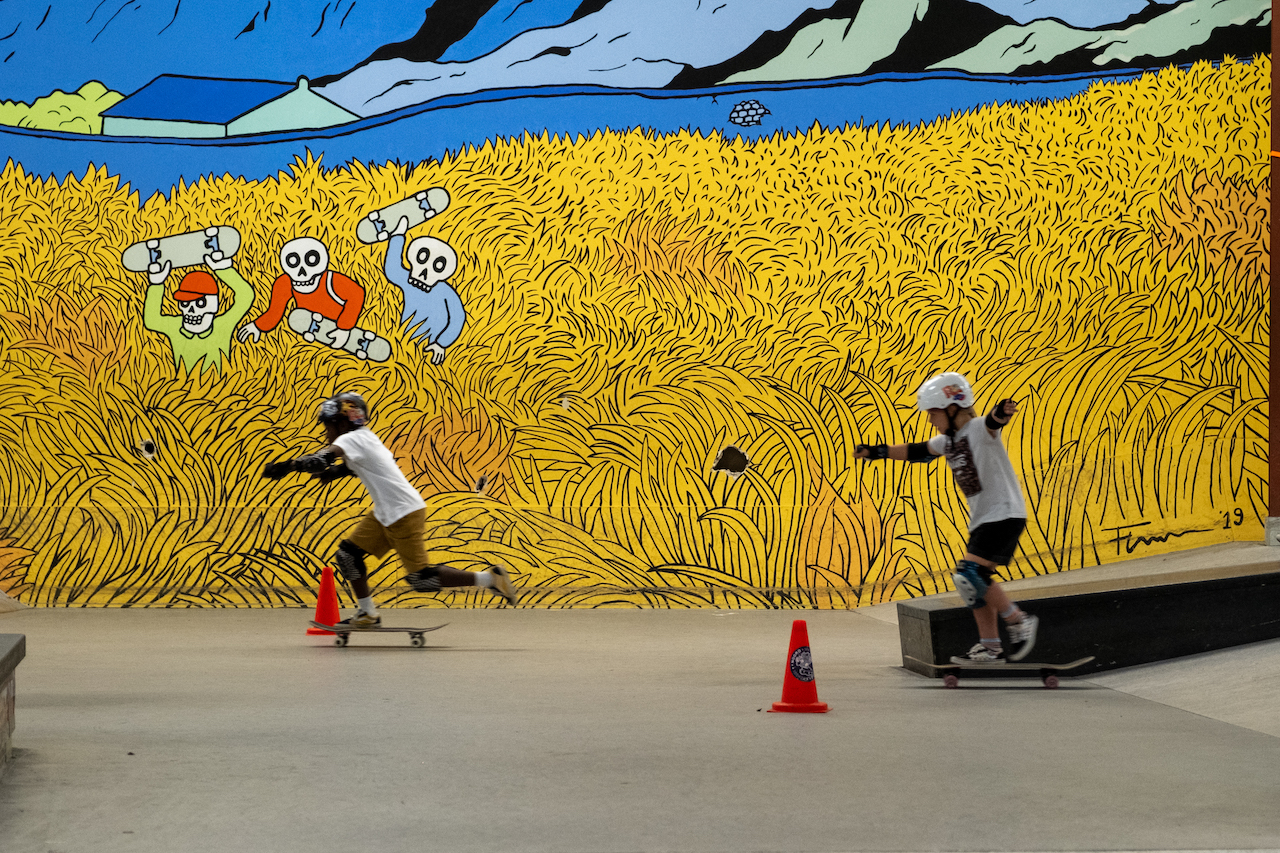
After working on this piece, I still feel like I haven't covered enough about the heavy debate in modern skateboarding: a creative art form or a sport?
The problem with this question is that there are multiple possible answers to it. There are indeed so many different paths that people take in skateboarding. Some engage more with the competitive side of it while others really focus more on its artistic style. One could rightfully say that, since the SSA approaches skateboarding more as a sport rather than an art form, it may forget the cultural aspects that others, who have had a very cultural upbringing of skateboarding, are so passionate about. Fortunately, kids at the SSA are fully capable of bringing their creativity to skateboarding, both in and outside of lessons. The general idea of skateboarding as a societal and mentally-benefitting hobby very much exists at the SSA. The values of openness, positivity, and motivation are fully there and aim to combat negative emotions that tend to build up inside of us. It's also a space which makes skateboarding more accessible to the general people, some of whom wouldn't necessarily know about its culture in the first place. With a repertoire of lessons, mentors, and skate passports, participants go through a skateboarding process that is essentially organized for them. However, the SSA provides more than that. They engage kids from different ages and origins to come together, skate and just have fun. It really felt like any other skatepark, just with more structure and a guarantee of proper advice from mentors.
Every skater knows just how hard skateboarding can be, especially on bad days when you land nothing. Things like that also happen at the SSA, but the friendly company and the positive mindset they share make it easier for them to overcome things like that. To me, learning how to skate also means learning to love skateboarding despite its pitfalls. You have to appreciate the failures, the bad days where you don't land anything, and even those injuries that set you back a couple of months. Most of all, for those who are committed to it, skateboarding is a way of life. No matter which skateboarding environment one is in, it's a learning process that will always combine physical fitness, culturability, social life and resilience.
Photography by Charles Lanceplaine

